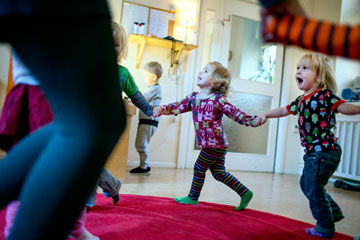
Children at Stockholm's Nicolaigarden preschool, which avoids gender stereotypes.
On a Sunny afternoon in September, a 5-year-old girl played in a sandbox. The box contained more mud than sand, and as she whacked at it with a plastic shovel, globs of dirt stained her pink dress. But at the Nicolaigarden preschool in Stockholm, no teacher chastised her, and certainly no one told her that girls aren't supposed to play like that. In fact, at Nicolaigarden, they try not to use the word girls at all.
Or boys either. One of the most popular toys at the school, for both sexes, is a set of dolls designed to teach about emotions. Each wears a different expression--one smiles broadly, another frowns--but that is almost all they wear. Except for the homely knit hats that top their Nordically blond heads, the dolls are completely naked, which makes it easy to see that they have no distinguishable gender.
And that just might be a metaphor for what this school, and perhaps Sweden as a whole, is trying to achieve. This is a country in the midst of a dramatic new experiment in gender equality--call it gender neutrality.
In the early 1970s, when the Swedish government began actively promoting women's rights, even feminists could hardly have imagined the successes to come: near parity in political representation, a near leveling of the playing field in the workplace, and fathers who share, if not equally then at least significantly, in the raising of their children. But if Sweden has gone further than almost any other country in the world to eradicate gender discrimination, it has reached a critical turning point, moving beyond mainstream feminist goals like equal pay and equal opportunity toward a society in which gender doesn't matter.
Supporters say that process is a necessary step toward eroding the lingering vestiges of sexism, and people around the world who care about gender equality are watching with keen interest to see what lessons Sweden can offer other societies. But critics charge that feminism has become something of a state religion in Sweden, to the point that the country is on the verge of doing away with the idea of men and women altogether--and in the process, they say, casting aside much of the joy and complexity that come with difference. For them, Sweden is a dangerous experiment in political correctness that would deny biological realities and impose artificial mandates of sameness. A country that has essentially built its national identity on the pursuit of equality, Sweden finds itself moving into uncharted territory over primal questions of justice and difference.
For the rest of the West, Sweden is "laying the groundwork," says Christine Ingebritsen, a professor of Scandinavian and women's studies at the University of Washington. "They're sort of postgender now and are focusing more on humanism, on what--as humans--is going to bring us all closer to equal rights. Sweden is our future."
